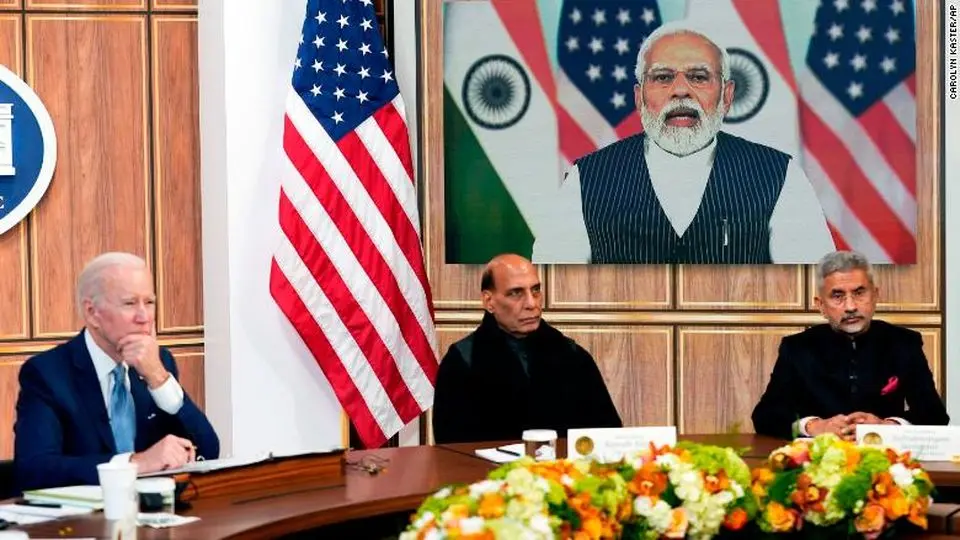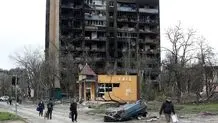These concerns help explain why Washington continues to criticize China's silence on Russia's actions in Ukraine, even as it turns quiet on India's.
Superficially, at least, India and China appear to have similar positions on the Ukraine war. Both have positioned themselves as neutral onlookers -- rather than vocal opponents -- both have called for peace and both have refused to condemn the invasion outright.
And both have strategic relationships with Russia that they are keen not to jeopardize.
Chinese President Xi Jinping and Russian leader Vladimir Putin declared in February their relationship had "no limits," while on some estimates India gets more than 50% of its military equipment from Russia.
But these similarities are only superficial. In fact, there are "vast differences," according to Kewalramani.
China has decried Western sanctions and
repeatedly blamed the US and NATO for the conflict, parroting Russia's view that NATO precipitated the crisis by expanding eastwards, Kewalramani said. Its state-run media has also amplified Russian talking points and disinformation.
India on the other hand has steered clear of criticizing NATO and appears keen to downplay its differences with the US. There have also been subtle shifts in India's position as the war has progressed.
Modi had talked to Ukrainian President President Volodymyr Zelensky, while China's leaders hadn't, pointed out Li Mingjiang, associate professor in international relations at Nanyang Technological University's S. Rajaratnam School of International Studies in Singapore. India had also been harsher in its criticism of alleged Russian war crimes, Li said.
This month, India's ambassador to the United Nations called the killings of civilians in Bucha "deeply disturbing," condemning them and calling for an open investigation.
Chinese Ambassador Zhang Jun on the other hand said the deaths were "deeply disturbing," but stopped short of attributing blame and urged "all sides" to "avoid unfounded accusations."
Significantly, after the Biden-Modi talks, US Secretary of State Antony Blinken noted India's condemnation of "killing of civilians in Ukraine" and its provision of "humanitarian assistance to the people of Ukraine."
The US may also be recognizing that India's relationship with Russia has historically followed a very different course to that of the West. Blinken noted that India's ties with Russia had "developed over decades, at a time when the United States was not able to be a partner to India."
That appeared to be a reference to the Cold War between the US and the USSR -- during which India was officially nonaligned. However, India began to lean towards the USSR in the 1970s when the US began providing military and financial assistance to its neighbor, Pakistan.
This was when Russia started providing arms to India, and India remains heavily reliant on Russia for military equipment to this day.
In 2018 India inked a $5 billion weapons deal with Russia for an air defense missile system, despite the deal potentially putting it in the crosshairs of Washington's Countering America's Adversaries Through Sanctions Act, a federal law passed in 2017 which imposed new sanctions on Iran, Russia and North Korea.
India's dependence on Russian arms limits its ability to denounce Moscow's actions in Ukraine. When Putin visited Delhi last December, Modi even called Putin a "dear friend."
All this has led to a position in which India is being "wooed by all sides," Pant said.
Moscow remains onside, and remains keen to sell India discounted oil. Russian Foreign Minister Sergey Lavrov even met his counterpart in Delhi this month and praised India for not looking at the Ukraine war "in a one-sided way".
And onside too is the West, ties with which have been growing ever closer since Modi's election in 2014. Annual India-US trade is more than $110 billion, compared to India's trade with Russia, which amounts to about $8 billion. In recent years, India has also become a major customer for US military equipment.
Even so, at Biden's meeting with Modi there remained a hint of unease. The US President urged his Indian counterpart not to step up his country's use of Russian oil, instead offering to help him acquire oil from elsewhere. India, which imports 80% of its oil needs, gets no more than 3% from Russia.
So it appears India has managed to pull off an impressive balancing act.
"India actually comes out very strong from this crisis," Pant said. "And that's quite a feat actually."





